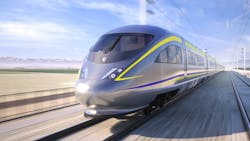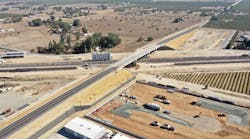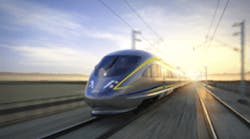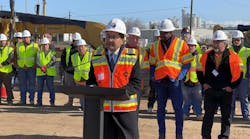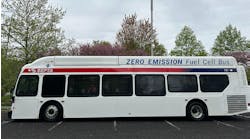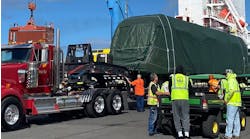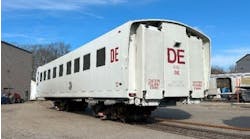The California High-Speed Rail Authority (CHSRA) has released the preliminary 3D modeling sketches and virtual simulation for California’s first electrified trainsets and some refreshed looks at future high-speed rail stations in the Central Valley.
This work is part of ongoing stakeholder engagement, focus groups and community workshops that will continue to refine the designs in the months ahead, as CHSRA prepares to launch high-speed rail passenger service between Merced and Bakersfield between 2030 and 2033.
“We’re thrilled to be at the point in this project where we are engaging with our community partners and the general public about what they want in their stations and on their trains,” said CHSRA CEO Brian Kelly. “The development of this statewide system, with iconic train cars and station design, will transform the passenger rail experience in California and the United States.”
Deutsche Bahn, CHSRA’s early train operator, began the process of assembling rough full-scale mockups of trainset interior design. The design process will evolve in the coming months through more extensive public feedback from the ADA community, regional partners and focus groups into high-fidelity mockups that will mirror the proposed interior design of California high-speed rail trains.
This design will be worked into the CHSRA’s trainset procurement process. A release for a Request for Proposal (RFP) is anticipated during the first quarter of 2024. Ultimately, the trains and track and systems will be tested to accommodate speeds up to 242 mph beginning in 2028.
In addition to trainset work, four Central Valley stations are currently advancing in concept design for the cities of Merced, Fresno, Bakersfield and the Kings/Tulare County region. The CHSRA and Joint Venture, Foster+Partners/Arup, are designing state-of-the-art facilities for people to not only take the train, but gather, shop and access easy connections into the surrounding communities and downtown areas.
“Through our engagement with the local authorities and communities, we have received valuable feedback that has helped us understand the priorities for each of the station cities while also underlining the transformational nature of the project,” said Peter Sokoloff, principal in charge for Foster+Partners. “This dialogue has undoubtably helped shape and define the initial station configurations and will continue as we look to refine and develop our initial concept design in the coming months.”
In June, the CHSRA received $20 million from the federal government for the Fresno High-Speed Rail Station Historic Depot Renovation and Plaza Activation Project, which is part of the overall station footprint in Fresno, Calif. Work on the plazas in Chinatown and Downtown Fresno and renovations of the historic depot will bring vibrancy and patrons to the area well before high-speed passenger operations between 2030 and 2033.
Since the start of construction, CHSRA has created more than 11,000 construction jobs, a majority going to residents from the Central Valley.
CHSRA has begun work to extend the 119 miles under construction to 171 miles of future electrified high-speed rail from Merced to Bakersfield. There are more than 25 active construction sites in California’s Central Valley, with CHSRA having environmentally cleared 422 miles of the high-speed rail program from the Bay Area to the Los Angeles Basin.
